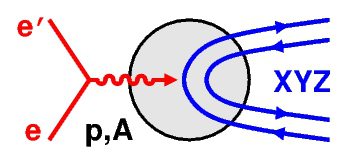The workshop will be conducted in hybrid mode. All presentations and discussions will be fully accessible to remote and local participants.
Remote participants connect through ZOOM using this link: [ZOOM link].
Local participants meet in the CFNS Seminar Room C-120, Physics Department, Stony Brook University.
Description: Heavy-quark systems play an essential role in the understanding of QCD and its emergent phenomena (multiple dynamical scales, parametric expansions). The discovery of exotic heavy quarkonium “XYZ” states in the early 2000’s has overturned the traditional picture of heavy quark interactions and created a new field of research, with experimental programs in pp scattering (LHCb, CMS, ATLAS) and e+e- annihilation (BELLE, BaBar, CLEO, BESIII) and theoretical studies. Understanding of these states is still in an early stage and depends critically on experimental data and progress with analysis and theory. Spectroscopy studies need to establish the universality of the resonances by observing them in various production channels and decay modes. Structure studies need to identify observables revealing the specific nature of the states and measure them in next-generation experiments.
Measurements at the EIC could have a major impact on the understanding of exotic heavy systems regarding both spectroscopy (new production channels) and structure (Q2 dependence in electroproduction, polarization observables, nuclear targets). The production of “ordinary” heavy quarkonia (J/ψ, Υ) is already a major part of the accepted EIC physics program and has been driving the detector requirements (tracking, vertex detection, PID). The extension to exotic XYZ states would be natural but presents specific challenges. The feasibility of such measurements depends on the expected production rates (mechanisms, energy dependence, luminosity) and the reconstruction requirements (resolution, backgrounds) and needs detailed assessment. First studies of exotic heavy meson production at EIC have been reported in the EIC Yellow Report.
The workshop aims to perform a comprehensive assessment of the feasibility of exotic heavy meson measurements with EIC and their physics impact in the context of the worldwide spectroscopy program. We will bring together theorists, experimentalists, and detector experts from the present spectroscopy efforts (collider and fixed-target experiments, hadronic and electromagnetic probes) and researchers working on EIC accelerator and detector development and physics simulations. Our assessment will be based on the current status of the EIC machine design and will link up with the on-going detector design effort.
Objectives
- Assess feasibility of exotic heavy meson production and reconstruction at EIC
- Identify possible contributions of EIC to XYZ spectroscopy: electroproduction, polarization
- Discuss advancing from “spectroscopy” to “structure” of exotic states as long-term goal
Topics
- Status of XYZ spectroscopy, impact of new measurements, long-term perspectives
- XYZ production in ep/γp - inclusive and exclusive, theory, mechanisms, models
- QCD-based approaches to quarkonium and XYZ production in ep/γp, factorization, NRQCD
- Energy dependence and luminosity requirements of XYZ measurements with EIC
- Detector requirements for XYZ reconstruction
- Photoproduction vs electroproduction of XYZ at EIC
- Polarization observables in XYZ physics at EIC
- Deuteron target measurements and isospin structure of XYZ states at EIC
- Possibility of comparing XYZ decay modes (including open charm) at EIC
- Searching for missing states in non-exotic quarkonium spectroscopy at EIC
- Structure of exotic states - current theories, observables, future measurements
- Lessons from light-quark spectroscopy: GlueX, CLAS, COMPASS
- XYZ physics prospects at future fixed-target facilities: GSI, J-PARC, JLab
The workshop will be conducted in hybrid mode, combining online participants and local participants at CFNS Stony Brook. All presentations and discussions will be fully accessible to remote and local attendees. Information about the online connection will be posted on this page. For any questions re remote participation or local conditions, please contact the organizers.

